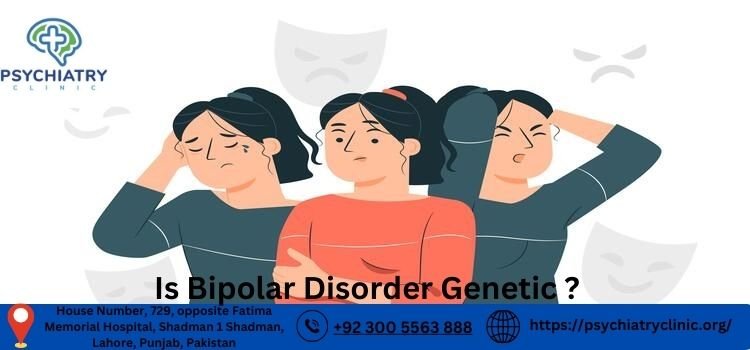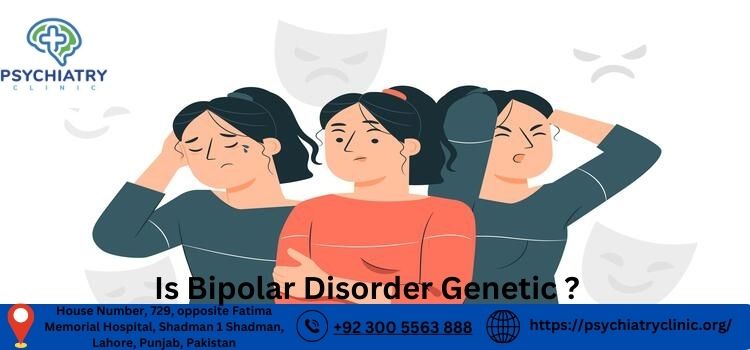Is Bipolar Disorder Genetic ? Comprehensive Guide
Living with a mental illness can be an overwhelming and isolating experience. It’s even more difficult when you don’t understand your condition or why it happens. For those living with bipolar disorder, one of the most common questions raised is bipolar disorder genetic or not.
In this comprehensive guide we will look at the latest research to identify any potential genetic links as well as potential environmental triggers that could be causing episodes of mania and depression.
Let’s dive in to get more details.
Is Bipolar Disorder Genetic?

The short answer is yes, bipolar disorder does have a genetic component. Studies have shown that those with a family history of the disorder are more likely to develop it themselves. In fact, having a first-degree relative with bipolar disorder increases an individual’s risk by up to 10 times. However, it’s important to note that having a genetic predisposition doesn’t necessarily mean that an individual will develop bipolar disorder. Environmental factors, such as stress or trauma, can also play a role in triggering the disorder.
How does Genetics Influence Bipolar Disorder ?
Genetic studies have identified multiple genes that may contribute to an increased risk of developing bipolar disorder. These genes are involved in important brain functions such as regulating mood and emotion, sleep patterns, and stress response. Variations in these genes can lead to imbalances in brain chemicals, such as dopamine and serotonin, which are known to play a role in mood disorders.
Identifying the Genetic Markers for Bipolar Disorder
While researchers have identified several possible genetic markers for bipolar disorder, there is still much more work to be done in order to fully understand how they contribute to the disorder. One promising study published in the journal Nature Communications found 30 genes linked to bipolar disorder. This research provides valuable insights into potential biological pathways and may lead to new treatments for the disorder.
The Role of Genetics in Bipolar Disorder

While the exact cause of bipolar disorder is still unknown, research has shown that genetics play a significant role. Studies have identified several genes that may be involved in the development of this disorder, including the CACNA1C gene which has been linked to both bipolar and schizophrenia.
Other factors such as hormonal imbalances and brain chemistry may also contribute to the development of bipolar disorder. It’s believed that these genetic and biological factors interact with environmental triggers, such as stress or drug use, to cause episodes of mania or depression.
Symptoms of Bipolar Disorder
- Bipolar disorder is a mental illness characterized by extreme mood swings.
- Manic episodes include symptoms such as increased energy, impulsivity, and reckless behavior.
- Depressive episodes involve feelings of hopelessness, low energy, and loss of interest in activities.
- Some individuals may also experience mixed episodes where symptoms of mania and depression occur simultaneously.
Treatment for Bipolar Disorder
While there is currently no cure for bipolar disorder, it can be effectively managed with proper treatment. This typically includes a combination of medication, therapy, and lifestyle changes.
Medications such as mood stabilizers and antipsychotics can help control symptoms and prevent episodes from occurring. Therapy, particularly cognitive-behavioral therapy (CBT), can help individuals learn coping strategies and manage their symptoms.
In addition, making healthy lifestyle choices such as getting regular exercise, maintaining a balanced diet, and practicing stress management techniques can also play an important role in managing bipolar disorder.
Exploring the Genetics Behind Bipolar Disorder
As mentioned earlier, having a family history of bipolar disorder increases an individual’s risk of developing the condition. It’s estimated that about 80% of individuals with bipolar disorder have at least one family member with a history of mood disorders.
While this evidence supports the idea that genetics play a role in bipolar disorder, it’s important to note that there isn’t just one gene responsible for the development of this disorder. Instead, it’s believed that multiple genes, each with a small effect, interact with environmental factors to increase an individual’s risk.
Coping with the Stigma Around Mental Illness
Unfortunately, there is still a lot of stigma surrounding mental illness, including bipolar disorder. This can make it difficult for individuals to seek help and receive the support they need. It’s important to remember that mental illness is not a personal choice or character flaw, but rather a medical condition that requires treatment. Educating oneself and others about bipolar disorder can help reduce stigma and increase understanding and empathy.
Seeking Support and Resources
If you or a loved one is living with bipolar disorder, know that you are not alone. Seeking support from mental health professionals, as well as connecting with others who understand your experience, can be incredibly beneficial. There are also many resources available online and in-person to help individuals manage their symptoms and live fulfilling lives.
Conclusion
In conclusion, we are aware of is bipolar gentic? While bipolar disorder does have a genetic component, it’s important to recognize that environment also plays a role. By understanding the potential genetic links and environmental triggers, individuals can better manage their mental health and seek appropriate treatment when needed.
Remember, if you or someone you know is struggling with bipolar disorder, don’t hesitate to seek support and treatment. You are not alone in this journey. So, let’s continue to educate ourselves and others about mental illness and break down the stigma surrounding it.
FAQs
Some of the frequently asked questions by people are mentioned below:
Is bipolar genetic from mother or father?
Bipolar disorder can be inherited from either the mother or father. Research has shown that if a first-degree relative, such as a parent or sibling, has bipolar disorder, an individual’s risk increases.
What age does bipolar start?
Bipolar disorder can start at any age, but it is most commonly diagnosed in the late teens or early adulthood. Some individuals may experience symptoms of bipolar disorder earlier or later in life.
What is the main cause of bipolar disorder?
The exact cause of bipolar disorder is still unknown, but it is believed to be a combination of genetic and environmental factors. Hormonal imbalances and changes in brain chemistry may also play a role in the development of this disorder.
How is bipolar passed on genetically?
Bipolar disorder is passed on genetically through a combination of multiple genes, each with a small effect. Environmental factors can also interact with these genes to increase an individual’s risk of developing the disorder.

